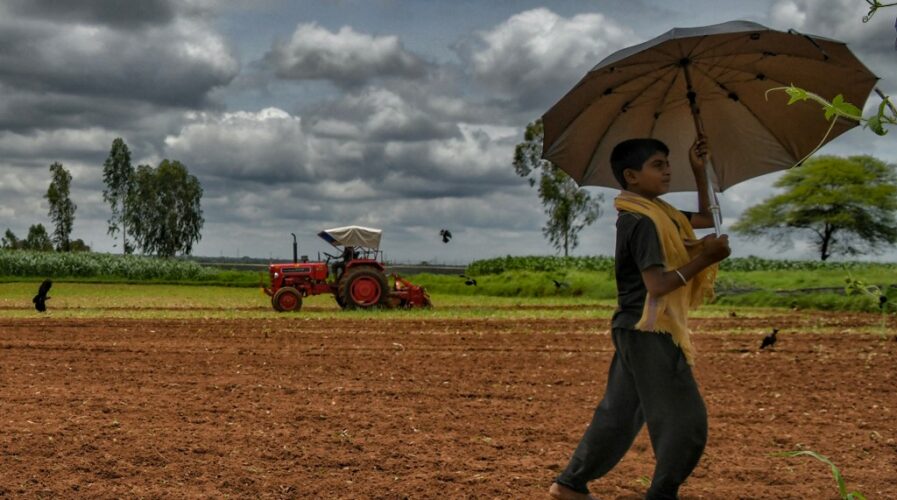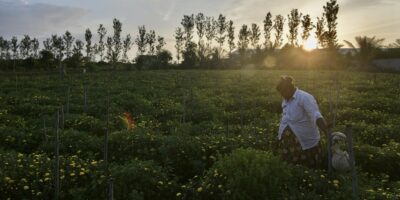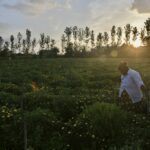
Agriculture feeds the world, but can agritech keep the industry alive and help agriculture-first nations? (Photo by Manjunath Kiran / AFP)
Global UN agritech challenge seeks solutions for small farmers
Agriculture feeds the world, but can agritech keep the industry alive? Although the global agricultural industry is massive, it remains stagnant or even regressive in certain regions still, since it’s one of the slowest to catch up to technological advancement.
According to the Food & Agriculture Organization of the United Nations (FAO), agriculture employs over one billion people across the globe. Furthermore, over 50% of micro small and medium enterprises (MSMEs) in emerging economies are also engaged in agriculture.
A large number of the people employed in agriculture are smallholder farmers who own less than 2 hectares of land, yet constitute 82% of total agriculture landholding.
In terms of production, smallholders play an important role in driving agriculture productivity, as they are responsible for more than 50-60% of agriculture produced in these countries.
Take India for example — the populous nation of over a billion people depend primarily on agriculture for their livelihoods, especially rural residents. Despite this, the industry’s contribution to its GDP has declined from 1951 to 2011 — a whopping 82% of farmers are still small and marginal in impact.
Although the nation has achieved grain self-sufficiency, food security is still an issue for the majority of people, and the poverty rate is still high at 30%.
The FAO also states that about 113 million people worldwide were already suffering from severe acute food insecurity before the COVID-19 pandemic. This figure is estimated to have dramatically increased in 2020-2021 with the UN WFP (world food program) estimating 272 million people already or at risk of becoming acutely food insecure.
Nevertheless, there is still hope on the horizon for many nations like India that are dependent on agriculture.
Agritech and agri-fintech startups may just be the answer to address prevailing issues within the traditionally manual and laborious industry — through innovation and the use of technology.
With data and intelligence, they promise disruptive potential with analytics, IoT, and crowdsourcing.
The UNCDF Agritech Challenge 2021
To this effect, the United Nations Capital Development Fund (UNCDF) launched the Agritech Challenge 2021 to address challenges faced by smallholder farmers across Asia and Africa, with the objective of helping to improve their financial health.
The challenge seeks solutions to address issues surrounding productivity, climate change, and supply chain, by also working alongside the International Fund for Agricultural Development (IFAD) and Bayer as partners.
“While agriculture is a lifeline in many developing countries, it is also a high-risk sector. It is subject to unpredictable factors from prices, policies, diseases, to erratic weather and climate change.
“Rabo Foundation is happy to support The Agritech Challenge, which is aligned with our focus on innovations in addition to traditional approaches to help develop a more self-reliant and shock responsive agriculture ecosystem that can address the issue of food security and also benefits the smallholder farmers,” said Arindom Datta, Executive Director, Rural & Development Banking/Advisory, Rabobank.
Anjani Bansal, Private Sector Partnerships Lead, Bill & Melinda Gates Foundation, is of the opinion that India’s innovation ecosystem has matured rapidly over the last decade and the creativity and vigor of Indian entrepreneurs and researchers can play a critical role in solving some of the toughest societal challenges.
“We are proud of our partnership with Atal Innovation Mission at NITI Aayog which will enable a supportive ecosystem for innovations that have the potential to deliver impact across multiple sectors, as well as facilitate a south-south platform that can provide opportunities to scale across multiple countries”, added Bansal.
How to get involved
Over the course of the Agritech Challenge, the participants will get access to industry & markets linkages, investors, and mentorship to help them expand to their chosen international market.
The UNCDF also hopes to enable cross-border collaborations among emerging markets across India, Indonesia, Malawi, Malaysia, Kenya, Uganda, Zambia through the challenge.
The Challenge will work towards helping participants build and test their solution in the new market, as part of UNCDF’s work under the Global Centre for Financial Health, with subsequent support on scaling the solution as well.
“The last year has been exceptionally difficult at the personal, communal, and economic level for so many people. As we look to the recovery phase, it is critical that the global financial architecture intensify its support to accelerate the achievement of the Sustainable Development Goals, specifically in frontier markets,” said UNCDF Executive Secretary Preeti Sinha.
According to Sinha, digital transformation can be a key enabler for driving recovery and resilience. Together with its partners, the UNCDF’s Financial Health Programme aims to support the development and expansion of digital solutions across borders that alleviate the constraints faced by small-holder farmers affected by the pandemic.
The Agritech Challenge 2021 is now open for applications from tech, agri-tech, and fintech innovators. The submission deadline is August 30, 2021.
To know more and apply, please visit: https://www.uncdf.org/finlab/agritechchallenge
The UNCDF’s partners for this challenge include Atal Innovation Mission – NITI Aayog (Govt. of India); the Bill & Melinda Gates Foundation, and Rabo Foundation.
READ MORE
- 3 Steps to Successfully Automate Copilot for Microsoft 365 Implementation
- Trustworthy AI – the Promise of Enterprise-Friendly Generative Machine Learning with Dell and NVIDIA
- Strategies for Democratizing GenAI
- The criticality of endpoint management in cybersecurity and operations
- Ethical AI: The renewed importance of safeguarding data and customer privacy in Generative AI applications


